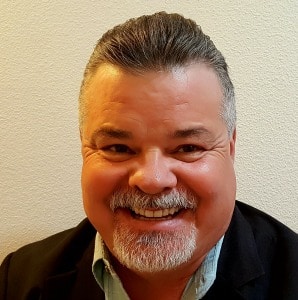
Darrell Calton is quite a storyteller, as you will soon find out. He’s also a finalist for a Radio Ink Radio Wayne Award, which will be given out at the Radio Show in Nashville later this month. He is the C.E.O. and market manager for Impact Radio in Meridian, Idaho. Calton started in radio at small stations in small markets, worked his way up to Sales Manager in Reno for Cumulus and D.O.S for Citadel in Boise before settling in to run the five-station cluster for Impact Radio. A former employee describes Calton as “the heart and soul of what radio broadcasting should be.”
Here’s our very detailed interview with Darrell Calton, a 2016 Radio Ink Radio Wayne Market Manager finalist.
Radio Ink: How long have you worked in radio?
Calton: Before I answer the questions of when I started and why, I think it is important to add context in terms of the actual medium of radio as it pertains to me from a historical
narrative. I grew up in a micro-community of less then 1,500 people. To put things into perspective, I graduated with one of the largest classes. Ever. There were 36 of us and rumor has it to this day only 31 had actual diplomas in the cover (I got mine!). We grew up in Wells, Nevada, elevation 5,630 feet. My father owned the movie theater back in the 1960s and 70s. For the most part of the sixties, until 1968, he was the sole outside media aside from some errant AM stations that made it through our mountain-locked town at night. No over-the-air television or cable in that time. He made a mint (until cable TV came in, see the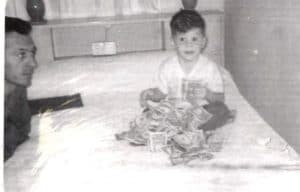 picture of me, to the right, in the center of my parents’ bed helping count the ticket money)! In 1968, cable came to town and my father’s business took a major hit, and by the late 1970s was barely getting by. Remember we had no radio that was not received from generous AM skip. Cable TV was the be all, end all with its four channels.
picture of me, to the right, in the center of my parents’ bed helping count the ticket money)! In 1968, cable came to town and my father’s business took a major hit, and by the late 1970s was barely getting by. Remember we had no radio that was not received from generous AM skip. Cable TV was the be all, end all with its four channels.
By 1975 my friends and I were typical 12-year-old boys. Summer nights were magic and it was in a day and age where our parents were comfortable with us sleeping out. In
addition to the sleeping bags, we had my father’s old battery-powered AM radio. I can still remember listening around 2 a.m. to KOMA 1520 to the greatest hits ever, and when the
skip would get really bad we would always seem to find KFI and listen to the antics of Charlie Fox and Danny Martinez, while trying to wrap our minds around the oddity of a
“traffic report” since we came from small-town America. My favorite song in 1977 was Dan Oday’s “Undercover Angel,” as I was just discovering the girl I would never marry.
I was always the “DJ” then, trying my best to imitate what the radio DJs were saying and playing, and had a damn fine Wolfman Jack impression by age 14. I will also never forget
sitting in my 1966 Ford Falcon Futura in 1980 as a junior in high school trying to impress a girl when I tuned in KOMA and much to my surprise and chagrin heard Country music!
By mid-1981, I graduated school and attended Utah State University as a full-ride music major and learned an awful secret about myself. I hated every minute of the music program. I could not see myself teaching music.
I had a fraternity brother a year older then myself who one night sat me down and told me about his part-time job. He was DJ for KBXN radio in Tremonton, Utah. His name was
Greg Passey and that was November of 1982. You see, Greg knew two things. His brother was miserable and he knew I had the makings of a “radio guy.”The following week he
got me a job and I started on air the first day I met Glacus Merrill, the owner and father of one of radio’s successful radio brokers, Greg Merrill. I knew I would be awful and asked
Glacus for some advice. He pounded me on the back and said, “Son, either make ’em love ya, or make ’em hate ya. Either way they will listen.” I am convinced “they” hated me. I
was 19 then and have taken a check from this business since. So the answer to the first question is 35 years come this November.
Radio Ink: Why did you choose radio as a career?
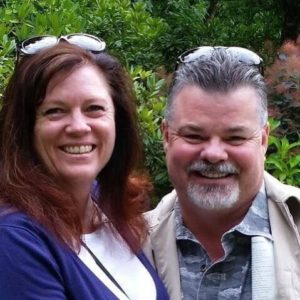
Calton: The answer to this question is shorter, and quite honestly, less interesting, assuming I did not put you to sleep already. I did not choose radio. It chose me. It interviewed me as I lay out as a young boy under the stars and listened to the sounds of Charlie and Danny and Wolfman and Kasey, to name a few. Later in life it led me to my beautiful wife Mona, whom I met in Salt Lake City where she worked for her legendary father as one of the first drive-time females on KRGO AM and then KRGO FM in the early 1980s. My three sons have all worked in the business and my middle son has become a successful VP and GM in his own right. The radio thing flows in all of our veins.
Radio Ink: What lead you into management?
Calton: Starvation, pure and simple. I used to watch all of the salespeople come and go at seemingly random hours, drive great cars, and while I am sure it was in my imagination, they all dated extremely beautiful counterparts. After signing off the morning show one day in 1984 and working as a PD for KRGO FM, I approached the GM to see if there was a part-time sales opportunity. There was and I did. Within a few years the commissions I pulled down started to outpace my programming salary. When I moved on I kept the sales stripes at the various places I worked and finally an opportunity came in 1986 to strap on programming and some sales management at a small FM in Elko, Nevada, where I became the general manager. The station grew in revenue, I got my first opportunity to discover my second love of radio by building the FM upgrade, and went on to add an AM station that I helped to build from the ground up.We eventually went on to bill over a million dollars a year with an AM/FM combo in a town of 25,000 people. That little combo ended up being one of the first in the western United States to go all digital on hard drive in the late 1990s.In 2003 our success garnered the attention of corporate radio in Reno, Nevada, and I finally joined Citadel Broadcasting.
Radio Ink: How does someone become a successful manager/leader of so many people in radio today?
Calton: There are two points I would make here.Years ago things were pretty simple and people, believe it or not, were wired in a similar fashion. The information age has changed all of that and communication within your cluster can make or break your operation. I started my career a long time ago. But take into consideration I was 19. I do not feel I have become a dinosaur from an age standpoint. From a career standpoint, for anyone over the age of about 35, I feel that at any moment, if you do not keep your eyes on the sky, that an extinction moment could come in the blink of an eye for those of us that are standing on the edge of the millennial migration to broadcast.We have entered an age where communication and motivation of our employees requires a multi-pronged approach that requires continual generational understanding and education for managers at all levels. If we are to continue to breathe new life into the industry we have to learn to communicate in shorter bursts with greater frequency to penetrate the fog of today’s information overload. Texting, Facebook. Instagram. Twitter. Snapchat. Apps. Pokemon Go. Television. Radio. Streaming. YouTube. Internet browsing. How many reading this have engaged in seven or more of these activities just today? How many before- or after-work emails or actual meetings?
As our society engages more and more with the information tsunami, we have to find ways to cut through the communication clutter and be relevant to our employees. Shorter
meetings, less lecture, and more individual interaction where employees can feel like they are welcome to contribute to solutions have helped integrate our generations. “Sharpen your own saw” as Chris Lytle would say, but know that teaching sales technique is just as important as understanding how to “motivate” a 25-year-old sales or programming recruit and why they may need something radically different than a 45-year-old vet. Stay up on current communication methods. In fact, read those books first.
The second point is simple. Lead by introducing a system where every department head is training their own replacement and have insisted that their replacement at least develop
a process to find their number two. People need hope, they need responsibility, and they need to share a vision of where the company needs and wants to go. And finally, people need to know that what they are doing right now matters.
Radio Ink: What is your digital strategy and is it working?
Calton: Let me be ambiguous for a moment with this answer. Yes and no. Yes inasmuch as we have an incredible and diverse internal marketing and engagement platform that we use to build and/or maintain P1/P2 listeners as we are in Radio Market 97,
but still stuck with a two-book diary system for ratings. We built out an extensive texting and email database, battle for #1 supremacy in terms of social media followers and regularly geofence/target our competitors events and gatherings through mobile technologies. After building and buying a stable of excellent signals over the last three years, we have moved from fifth in the market in adults 18-34, 18-49, and 25-54, to second place as a cluster, and have remained solid there for the last three books or 18 months. I credit good programming, great signals, and our digital engagement platform for going from last to second place with a shot at going number one.
Now, inasmuch as from a monetary standpoint, we have struggled with taking our own success and translating it directly to a growing and vibrant revenue stream coming from
advertisers. There are so many elements of digital floating from all players in the market we are finding market confusion among many advertisers. As an independent cluster, one
of the downsides is the fact we cannot provide some services the corporate clusters can provide from in-company digital departments. We simply do not have the resources to
provide SEO, website development, or hosting. What we do very well is integrate spot-and-dot radio schedules with custom-built social media campaigns and mobile geo-fencing/retargeting on a case by case basis, and I can say that revenue stream is growing, just at a slower pace.
Radio Ink: What motivates you to walk into your radio station every day?
Calton: I love this business. I love Mom and Pop American businesses and our ability to help them grow. I love the community involvement and the fact that we as an industry can make such a difference by involving ourselves and our broadcast properties to take on issues and help solve problems in the communities. I love the fact we can educate, entertain, and teach. Lastly, I would say that each day in this industry is unique, bringing its own set of challenges and successes. There really is no time or opportunity to become disenfranchised due to boredom.
Radio Ink: What keeps you up at night?
Calton: Wondering if I have done enough to elevate each and every member of my staff. As we attain the higher levels of management there is a real tendency to contract in on yourself from the weight of the job and become very narrowly focused on the back end of the business. That place of black and white, and certainly sometimes red (heaven forbid). It is very easy to get lost in that and forget the thing that makes this business fun, the thing that makes it work is the people. I work each and every day at making sure I try to connect personally with all of my employees, a few at a time. I cycle through lunches, try to take time at the water cooler, and sometimes just plunk myself down in their office or space to check the temperature.
Radio Ink: How do you educate yourself so you are always on top of your game and should other managers?
Calton: I subscribe to every pertinent trade newsletter or blog I can lay my hands on, and I read each one every morning from top to bottom five minutes after opening my eyes. That is stage one of the saw sharpening. We have a regular dialogue between department heads about books, have a budget for learning materials for all employees, and incorporate “assignments” regularly. Just this week we distributed copies of Brian Tracey’s Eat That frog! to our admin and sales staff. I worked through an exercise of the Five Languages of Appreciation in the Workplace by Chapman and White with a manager that was struggling with his subordinates. It is not enough to read self-help books or attend education seminars; you have to integrate it into your culture. Stage two is integrating knowledge.
In closing, I would like to say thanks to whomever nominated me. I was honored by Radio Ink as a top manager for medium markets in 2009 and that was a major deal for me. Just
being considered for the Radio Wayne Award is right up there with that. I grew up two blocks away from the railroad tracks and some would argue maybe on the wrong side.
Radio never cared about that, it only cared that I worked hard. I have been blessed to have been in it, blessed to have met my wife in the business, and blessed to have raised at least some of my sons in it.
Congratulate Darrell on being such a positive force for radio for so many years [email protected]



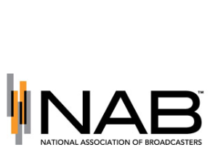

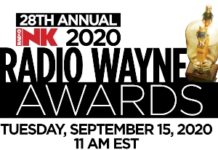
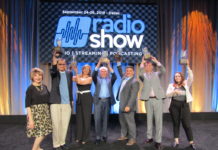


Darrell (known to his family as Herk), You have “ROCKED” the radio industry, and you “ROCK” as the best brother any three sisters could ever, ever have on the face of this earth. There are no words to express the pride we feel in your accomplishments. We have seen you work 24 – 7 for years in order to reach the highest standards possible. Regardless if you win this award or not, you are a winner with Cher, Robyn and Nette and all of our children and grandchildren. You have warmed our hearts with your robust personality and heart. Love and Hugs, Lynette